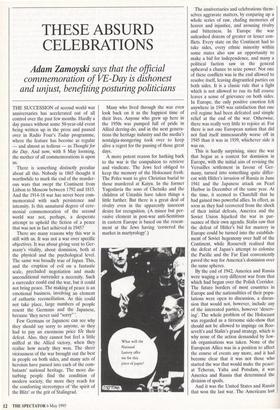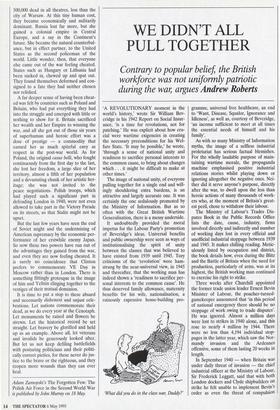THESE ABSURD CELEBRATIONS
Adam Zamoyski says that the official
commemoration of VE-Day is dishonest and unjust, benefiting posturing politicians
THE SUCCESSION of second world war anniversaries has accelerated out of all control over the past few months. Hardly a day passes without some 50-year-old event being written up in the press and paused over in Radio Four's Today programme, where the feature has become as regular ŌĆö and almost as tedious ŌĆö as Thought for the Day. And now, with 8 May looming, the mother of all commemorations is upon
US.
There is something distinctly peculiar about all this. Nobody in 1865 thought it worthwhile to mark the end of the murder- ous wars that swept the Continent from Lisbon to Moscow between 1792 and 1815. And the 1914-18 war has never been com- memorated with such persistence and intensity. Is this unnatural degree of cere- monial commemoration of the second world war not, perhaps, a desperate attempt to uphold the fiction of a peace that was not in fact achieved in 1945?
There are many reasons why this war is still with us. It was not a war over specific objectives. It was about giving vent to Ger- many's vitality, about dominion, both at the physical and the psychological level. The same was broadly true of Japan. This, and the eruption of evil on a fantastic scale, precluded negotiation and made unconditional surrender a necessity. Such a surrender could end the war, but it could not bring peace. The making of peace is an emotional business, involving an element of cathartic reconciliation. As this could not take place, large numbers of people resent the Germans and the Japanese, because 'they never said "sorry" '.
Few Germans or Japanese can see why they should say sorry to anyone, as they had to pay an enormous price fdr their defeat. Also, they cannot but feel a little miffed at the Allied victory, when they realise how nearly they won. The sheer viciousness of the war brought out the best in people on both sides, and many acts of heroism have passed into each of the com- batants' national heritage. The more dis- turbing people find the condition of modern society, the more they reach for the comforting stereotypes of 'the spirit of the Blitz' or the grit of Stalingrad. Many who lived through the war even look back on it as the happiest time of their lives. Anyone who grew up here in the 1950s was pumped full of pride in Allied derring-do, and in the next genera- tions the heritage industry and the media's nostalgia-mongering took over to keep alive a regret for the passing of those great days.
A more potent reason for harking back to the war is the compulsion to retrieve and vindicate. The Jews feel obliged to keep the memory of the Holocaust fresh. The Poles want to give Christian burial to those murdered at Katyn. In the former Yugoslavia the sons of Chetniks and the children of Ustashis have taken things a little further. But there is a great deal of rivalry even in the apparently innocent desire for recognition. (A minor but per- vasive element in post-war anti-Semitism in eastern Europe is based on the resent- ment at the Jews having 'cornered the market in martyrology'.) The anniversaries and celebrations them- selves aggravate matters, by conjuring up a whole series of raw, chafing memories of horror and injustice, and arousing rivalry and bitterness. In Europe the war unleashed dozens of greater or lesser con- flicts. Every state on the Continent had to take sides, every ethnic minority within some states also saw an opportunity to make a bid for independence, and many a political faction saw in the general upheaval a chance to seize power. Not one of these conflicts was in the end allowed to resolve itself, leaving disgruntled parties on both sides. It is a classic rule that a fight which is not allowed to run its full course leaves a sense of grievance on both sides. In Europe, the only positive emotion felt anywhere in 1945 was satisfaction that one evil regime had been defeated and simple relief at the end of the war. Otherwise, there was really very little to rejoice at. For there is not one European nation that did not find itself immeasurably worse off in 1945 than it was in 1939, whichever side it was on.
This is hardly surprising, since the war that began as a contest for dominion in Europe, with the initial aim of revising the Versailles settlement in favour of Ger- many, turned into something quite differ- ent with Hitler's invasion of Russia in June 1941 and the Japanese attack on Pearl Harbor in December of the same year. At the time, it seemed to Churchill that he had gained two powerful allies. In effect, as soon as they had recovered from the shock of their initial defeats, America and the Soviet Union hijacked the war in pur- suance of their own agenda. Stalin saw that the defeat of Hitler's bid for mastery in Europe could be turned into the establish- ment of Soviet hegemony over half of the Continent, while Roosevelt realised that the defeat of Japan's attempt to colonise the Pacific and the Far East conveniently paved the way for America's dominion over the same spheres.
By the end of 1942, America and Russia were waging a very different war from that which had begun over the Polish Corridor. The future borders of most countries in Europe and the nationalities of their popu- lations were open to discussion, a discus- sion that would not, however, include any of the interested parties, however 'deserv- ing'. The whole problem of the Holocaust was regarded as a tiresome side-show that should not be allowed to impinge on Roo- sevelt's and Stalin's grand strategy, which is why none of the action demanded by Jew- ish organisations was taken. None of the European Allies was in a position to affect the course of events any more, and it had become clear that it was not those who started the war that would make the peace: at Teheran, Yalta and Potsdam, it was America and Russia that determined the division of spoils. And it was the United States and Russia that won the last war. The Americans lost 500,000 dead in all theatres, less than the city of Warsaw. At this tiny human cost, they became economically and militarily dominant. Russia lost far more, but she gained a colonial empire in Central Europe, and a say in the Continent's future. She became the natural counterbal- ance, but in effect partner, to the United States as the second policeman of the world. Little wonder, then, that everyone else came out of the war feeling cheated. States such as Hungary or Lithunia had been sucked in, chewed up and spat out. They found themselves deformed and con- signed to a fate they had neither chosen nor relished.
A far deeper sense of having been cheat- ed was felt by countries such as Poland and Britain, who had put everything they had into the struggle and emerged with little or nothing to show for it. Britain sacrificed her wealth and her Empire to winning the war, and all she got out of those six years of superhuman and heroic effort was a dose of prestige ŌĆö a commodity that earned her as much spiteful envy as respect in the post-war world. As for Poland, the original casus belli, who fought continuously from the first day to the last, she lost her freedom, a large slice of her territory, almost a fifth of her population and a devastating chunk of her artistic her- itage; she was not invited to the peace negotiations. Polish troops, which had played such a significant part in defending London in 1940, were not even allowed to take part in the Victory Parade on its streets, so that Stalin might not be upset.
But the last few years have seen the end of Soviet might and the undermining of American supremacy by the economic per- formance of her erstwhile enemy Japan. So now these two powers have run out of the advantages they gained from the war, and even they are now feeling cheated. It is surely no coincidence that Clinton prefers to commemorate VE Day in Moscow rather than in London. There is something fittingly grotesque in the image of him and Yeltsin clinging together to the vestiges of their mutual dominion.
It is time to put a stop to these absurd and necessarily dishonest and unjust cele- brations. Let nations commemorate their dead, as we do every year at the Cenotaph. Let monuments be raised and flowers be strewn. Let the historical record be set straight. Let bravery be glorified and held up as an example. Above all, let veterans and invalids be generously looked after. But let us not keep defiling battlefields with posturing politicians and their politi- cally correct pieties, for these never do jus- tice to the brave or the righteous, and they reopen more wounds than they can ever heal.
Adam Zamoyski's The Forgotten Few: The Polish Air Force in the Second World War is published by John Murray on 18 May.



































































 Previous page
Previous page